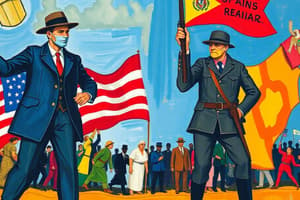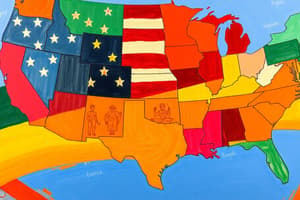Podcast
Questions and Answers
Who was Queen Liliuokalani?
Who was Queen Liliuokalani?
- An American Admiral
- Secretary of State who purchased Alaska
- A Cuban poet
- Queen of Hawaii who was forced to give up her throne (correct)
What is United States Imperialism?
What is United States Imperialism?
Belief that the U.S. should take economic, political, and military control over weaker countries.
Who was Alfred T. Mahan?
Who was Alfred T. Mahan?
U.S. admiral who supported the growth of the U.S. Navy and colonies overseas.
What did William Seward purchase from Russia?
What did William Seward purchase from Russia?
What is Pearl Harbor?
What is Pearl Harbor?
Who was Jose Marti?
Who was Jose Marti?
Who was Valeriano Weyler?
Who was Valeriano Weyler?
What is yellow journalism?
What is yellow journalism?
What was the de Lome letter?
What was the de Lome letter?
What happened to the U.S.S. Maine?
What happened to the U.S.S. Maine?
Who was George Dewey?
Who was George Dewey?
Who were the Rough Riders?
Who were the Rough Riders?
What is San Juan Hill known for?
What is San Juan Hill known for?
What did the Treaty of Paris (1898) accomplish?
What did the Treaty of Paris (1898) accomplish?
What is the Foraker Act?
What is the Foraker Act?
What did the Platt Amendment do?
What did the Platt Amendment do?
What is a protectorate?
What is a protectorate?
Who was Emilio Aguinaldo?
Who was Emilio Aguinaldo?
Who was John Hay?
Who was John Hay?
What were the Open Door notes?
What were the Open Door notes?
What was the Boxer Rebellion?
What was the Boxer Rebellion?
What is the Panama Canal?
What is the Panama Canal?
What is the Roosevelt Corollary?
What is the Roosevelt Corollary?
What is dollar diplomacy?
What is dollar diplomacy?
Who was Francisco 'Pancho' Villa?
Who was Francisco 'Pancho' Villa?
Who was Emiliano Zapata?
Who was Emiliano Zapata?
Who was John J. Pershing?
Who was John J. Pershing?
What was the Anti-Imperialist League?
What was the Anti-Imperialist League?
What did the Spanish-American War accomplish?
What did the Spanish-American War accomplish?
Flashcards are hidden until you start studying
Study Notes
Queen Liluokalani
- Last reigning monarch of Hawaii, deposed due to U.S. economic interests.
United States Imperialism
- Ideological belief asserting U.S. entitlement to exert control over weaker nations politically, economically, and militarily.
Alfred T. Mahan
- U.S. naval officer who advocated for a strong navy and overseas colonies to enhance national power.
William Seward
- Secretary of State who orchestrated the purchase of Alaska from Russia for $7.2 million, enhancing U.S. territory.
Pearl Harbor
- Strategic U.S. naval base established in Hawaii, pivotal for military operations in the Pacific.
Jose Marti
- Influential Cuban poet and journalist who played a key role in advocating for Cuban independence from Spanish rule.
Valeriano Weyler
- Spanish General dispatched to Cuba to quell unrest; known for harsh tactics against Cuban rebels.
Yellow Journalism
- Sensationalist news reporting aimed at attracting attention and stirring public emotions, notably during the Spanish-American War.
de Lome Letter
- A private correspondence from a Spanish diplomat mocking President McKinley, igniting American anger.
U.S.S. Maine
- An American battleship whose explosion in Havana harbor became a catalyst for the Spanish-American War, blamed on Spain.
George Dewey
- American naval commander famous for leading a surprise attack on the Spanish fleet in the Philippines.
Rough Riders
- A volunteer cavalry regiment led by Theodore Roosevelt that gained fame during the Spanish-American War, especially at San Juan Hill.
San Juan Hill
- Site of a significant battle during the Spanish-American War where Roosevelt's Rough Riders played a crucial role in victory.
Treaty of Paris (1898)
- Agreement that officially ended the Spanish-American War, marking the beginning of American colonial expansion.
Foraker Act
- Legislation that established a civilian government in Puerto Rico, ending military rule after the Spanish-American War.
Platt Amendment
- Inserted into Cuba's constitution, allowing U.S. intervention in Cuban affairs and ensuring American influence in the region.
Protectorate
- A political arrangement where a country exercises control over a less powerful nation while allowing it limited self-governance.
Emilio Aguinaldo
- Leader of the Filipino rebellion against U.S. colonial rule following the Spanish-American War.
John Hay
- U.S. Secretary of State known for the Open Door Policy promoting equal trade opportunities in China.
Open Door Notes
- Diplomatic messages by John Hay advocating for the preservation of China's territorial integrity and open trade access for all nations.
Boxer Rebellion
- Anti-foreign uprising in China aimed at expelling Western influence and interventions in Chinese affairs.
Panama Canal
- Engineering marvel creating a crucial maritime passage between the Atlantic and Pacific Oceans, significantly impacting trade routes.
Roosevelt Corollary
- Extension of the Monroe Doctrine asserting U.S. rights to intervene in Latin American countries to protect U.S. interests.
Dollar Diplomacy
- Foreign policy tool emphasizing the use of economic power to safeguard American business interests in foreign nations.
Francisco "Pancho" Villa
- Mexican revolutionary leader who led uprisings against the Mexican government and was known for cross-border raids against the U.S.
Emiliano Zapata
- Prominent Mexican revolutionary who championed agrarian reform and fought for the rights of the peasantry.
John J. Pershing
- U.S. General tasked with locating and capturing Pancho Villa following his violent attacks on American soil.
Anti-Imperialist League
- Coalition advocating for U.S. isolationism and opposing imperialist policies that disregarded the consent of governed populations.
The Spanish American War
- Conflict that resulted in the U.S. emerging as a global power, marked by its victory over Spain and acquisition of territories.
Studying That Suits You
Use AI to generate personalized quizzes and flashcards to suit your learning preferences.




